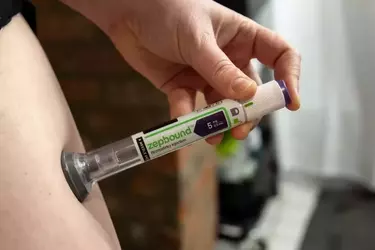Anti-obesity drugs are showing promise for an ever-expanding list of diseases
By Peter LoftusMay 25, 2025 10:00 pm ET

Photo: F. Martin Ramin/The Wall Street Journal
Should Ozempic be added to the water supply?
That is the kind of half-joking question that doctors kick around when a new class of drugs begins to help a big chunk of the population. Cardiologists used to quip about spiking water systems with cholesterol-reducing statins because of their ability to prevent heart attacks.
Now, Ozempic and others in the “GLP-1” category of drugs are approaching that critical mass. They are showing promise for an ever-expanding list of diseases, beyond today’s most common uses of weight loss and treating diabetes. Heart, kidney and liver diseases. Sleep apnea. Arthritis. Alzheimer’s disease. Alcohol addiction. Even aging. Some of these are potential benefits that need further study.
“It is getting to the point of wondering what GLP-1 agonists aren’t good for,” pharmaceutical researcher and blogger Derek Lowe wrote in the academic journal Science last year.
If this trajectory continues, doctors say millions more people would benefit from them—maybe even one-third to a majority of adults.
But they also caution about use of the drugs in people who don’t medically fit the bill because it could cause malnourishment. Doctors would have to figure out ways to guard against excessive weight loss in people who aren’t overweight, perhaps putting them on special diets, said Dr. Scott Isaacs, an endocrinologist in Atlanta.
The drugs—which also include Wegovy, Mounjaro and Zepbound—mimic naturally occurring gut hormones such as GLP-1. The medicines promote production of insulin, which helps control blood-sugar levels in people with Type 2 diabetes. They suppress appetite and make people feel full faster when eating, helping overweight people lose many pounds.
In diabetes and obesity alone, the eligible patient population is huge. More than 100 million American adults—or 40%—have obesity. About 38 million have diabetes.
Many of the proven and potential benefits of the drugs cascade from their effect on obesity. Losing weight relieves sleep apnea. It takes pressure off the joints, helping with arthritis.
“If you treat obesity, all of the complications of obesity that we spend a lot of our time treating in medicine should get better,” said Dr. Louis Aronne, director of the Comprehensive Weight Control Center at Weill Cornell Medicine.

Eli Lilly’s Zepbound and other GLP-1 drugs help control appetite and blood sugar by mimicking naturally occurring gut hormones. Photo: Shelby Knowles/Bloomberg News
But it also seems likely that some benefits are independent of weight loss, possibly because of anti-inflammatory effects of the drugs.
“The science is evolving very quickly in understanding how these medications affect so many organs and inflammation,” said Dr. Robert Kushner, an obesity-treatment specialist at Northwestern University’s Feinberg School of Medicine.
Doctors say GLP-1-type drugs may help with psoriatic arthritis, an autoimmune condition that causes joint pain and skin rashes, because of weight loss but also for their potential to reduce inflammation.
Susan Abernethy of North Cove, Wash., started taking Eli Lilly’s diabetes drug Mounjaro in 2023 to help treat her psoriatic arthritis after older treatments weren’t working as well.
The 58-year-old chief operating officer of a nonprofit credits Mounjaro with helping her lose weight and relieving her joint pain. She takes it along with Taltz, which is approved to treat psoriatic arthritis. Her insurance pays for the combination in part because she also has Type 2 diabetes.
“After about four years of not being able to run and do things, I’ve been able to do a couple of 5Ks again,” she said. “I can walk longer on the beach than before.”
Lilly is studying the combination of Taltz and Mounjaro’s main ingredient to treat psoriatic arthritis in a Phase 3 study, with hopes of seeking regulatory approval of the use if the study is successful.
Doctors are also seeing success in treating people with certain liver diseases. Isaacs prescribes GLP-1s for people with a fatty-liver condition called metabolic dysfunction-associated steatohepatitis, or MASH, which is estimated to afflict about 15 million Americans.
A study published in the New England Journal of Medicine in April found that semaglutide, the main ingredient of Ozempic and Wegovy, improved the condition in patients.
Another area being considered: Alzheimer’s disease. Researchers believe GLP-1s may have neuroprotective effects, slowing loss of brain volume. A small study in the U.K. last year found that Novo Nordisk’s GLP-1 liraglutide slowed cognitive decline versus a placebo. Novo is conducting a Phase 3 trial of semaglutide in patients with early Alzheimer’s.

Production of Novo Nordisk’s Wegovy. If many more people are going to take GLP-1 drugs, more capacity is needed. Photo: Charlotte de la Fuente/Bloomberg News
About 137 million American adults—more than half of the adult population—are eligible for treatment with the GLP-1 drug semaglutide, based on having Type 2 diabetes, meeting the threshold for excess body weight, or having established cardiovascular disease and excess weight, researchers estimated in a paper published in JAMA Cardiology last year. In comparison, about 82 million U.S. adults are eligible for statins.
But only a fraction of those eligible are currently taking a GLP-1 drug—about 8.3 million in the U.S. this year, TD Cowen estimated. The percentage of the eligible population taking a GLP-1 outside the U.S. is even smaller.
“Global uptake of weight-loss drugs is minuscule relative to the addressable market,” TD Cowen analysts wrote in a research note.
Still, some people clearly shouldn’t take the drugs. “I do believe that a large percent of the population, but not everybody, is going to be able to get some benefit,” Aronne said.
People with a history of a type of thyroid cancer, or with certain head and neck tumors, shouldn’t take them because earlier studies showed the drugs caused those types of tumors in rats.
Some doctors are reluctant to prescribe them to people with a history of pancreatitis because some patients taking the drugs have developed severe cases of that condition. And some doctors shy away from prescribing them for cosmetic weight loss when no other medical conditions are present.
Use of the drugs will surely grow. Morgan Stanley analysts estimate that by 2035, the number of Americans using a GLP-1 for obesity alone will rise to about 29 million. But even that would only represent 20% of the eligible obesity population.
That is because anti-obesity drugs are expensive. List prices are over $1,000 a month, many insurance plans don’t cover them and even manufacturer-discounted prices are still several hundred dollars a month.
Tolerability and manufacturing capacity of the drugs might also be issues. Some patients stop taking the drugs because they suffer unpleasant gastrointestinal side effects. And two main manufacturers, Lilly and Novo, only recently resolved drug shortages by increasing production. But they are still far from reaching enough capacity to supply significantly bigger percentages of both current and future eligible populations.
More studies and better drugs could help boost the treatment rate. Companies are developing newer GLP-1s that could deliver greater weight loss, and pill versions that might be appealing to patients who don’t like getting shots.
Source (Archive)